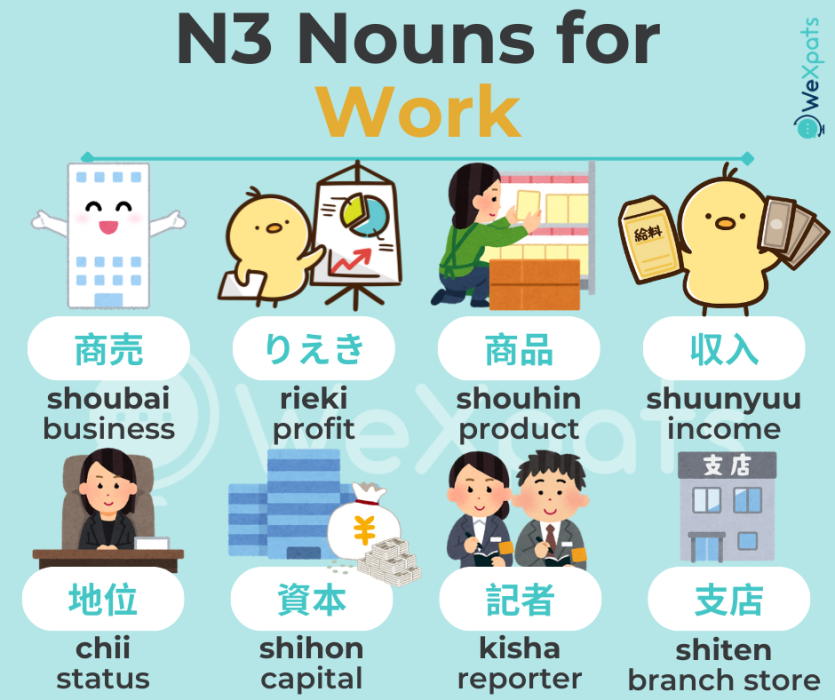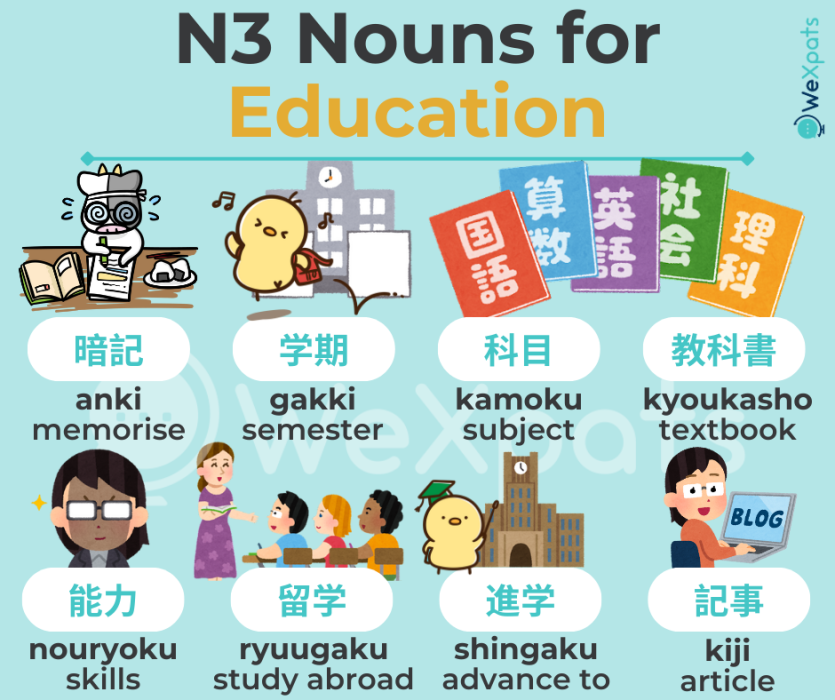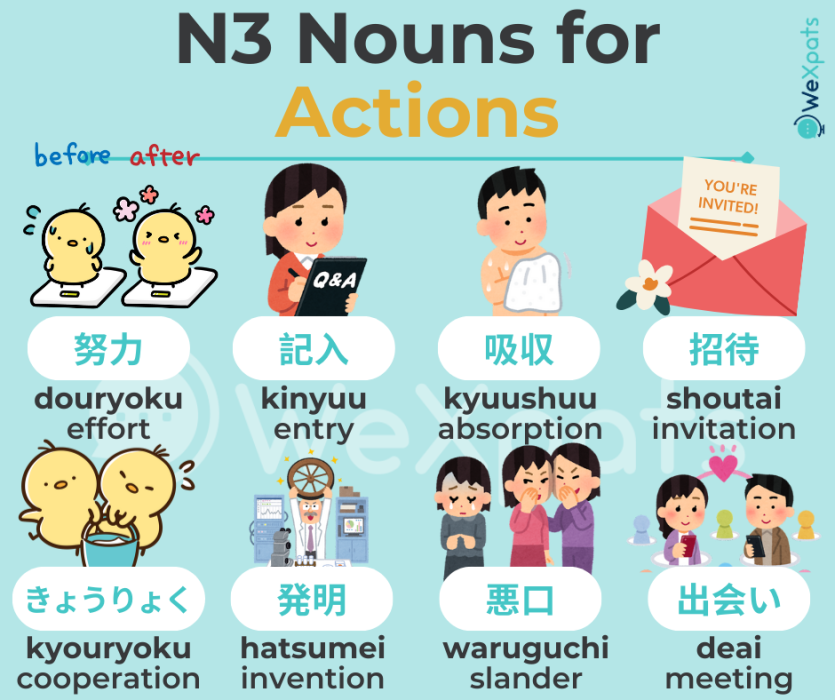In the N5 Nouns Lists and N4 Nouns Lists, we learnt many basic Japanese nouns useful for daily conversation and living. In N3 Nouns List (Part 1), we will cover Japanese nouns from 3 categories - “Work”, “Education”, “Actions”.
At the JLPT N3 level, there are many questions written with Kanji, so be sure to memorise their reading as well. In this part, we will cover 51 nouns at the N3 level. Be sure to understand the meaning and usage of each noun.
If you would like to review the categories of Japanese nouns and N4 nouns, please check N4 Nouns Lists ① ② ③ ④.
Table of Contents
- N3 Lesson - Negative Prefixes for Japanese Nouns
- N3 Nouns List - Work
- N3 Nouns List - Education
- N3 Nouns List - Actions
N3 Lesson - Negative Prefixes for Japanese Nouns
Some Japanese nouns carry a different meaning when a prefix is added to it. Japanese negative prefixes include 不 (Fu), 無 (Mu), 非 (Hi), and 未 (Mi). Remember how to use them with the following examples.
不 (Fu) + Noun : meaning cannot ~, unable to ~, no/not ~
-
不自由 (Fujiyuu) - inconvenient; inability
Explanation: 自由 (Jiyuu) means freedom, adding 不 (Fu) makes it into “no freedom” -
不安定 (Fuantei) - unstable; insecure
Explanation: 安定 (Antei) means secure or stable, adding 不 (Fu) makes it into “not stable” or “not secure” -
不合格 (Fugoukaku) - failure; rejection; disqualification
Explanation: 合格 (Goukaku) means passing (an exam) or success (in something), adding 不 (Fu) makes it into “cannot pass” or “no success”
無 (Mu) + Noun : meaning without ~; no ~; ~less
-
無意味 (Muimi) - meaningless; no meaning; without meaning
-
無計画 (Mukeikaku) - lacking a plan; without a plan
-
無免許 (Mumenkyo) - without a license; unlicensed
非 (Hi) + Noun : meaning not/no ~
-
非日常 (Hinichijou) - the unexpected; the extraordinary
Explanation: 日常 (Nichijou) means daily life or the norm, adding 非 (Hi) makes it into “not the norm” -
非常識 (Hijoushiki) - lack of/no common sense; irrational; senseless
Explanation: 常識 (Joushiki) means common sense, adding 非 (Hi) negates that, making it into “no common sense” -
非公開 (Hikoukai) - undisclosed; private; closed
Explanation: 公開 (Koukai) means disclose or make public, adding 非 (Hi) makes it into “non-disclosed” or “not making public”
未 (Mi) + Noun : meaning not yet ~
-
未使用 (Mishiyou) - not yet used; unused
-
未経験 (Mikeiken) - inexperienced (no experience yet)
-
未解決 (Mikaiketsu) - unresolved (not resolved yet); unsettled (not settled yet); pending; outstanding
N3 Nouns List - Work
Not just for the JLPT tests, Work-related nouns are useful to learn for job-hunting activities in Japan and business situations. Remember them well as they will come in useful in conversation.

Example Sentences Using N3 “Work” Nouns
1. 彼は、生まれ育った街で商売 (Shoubai)を始めました。
(Kare wa, umare sodatta machi de shoubai wo hajimemashita.)
- He started a business in the town where he was born and raised.
2. 新しい事業がうまくいき、利益 (Rieki)を出すことができた。
(Atarashii jigyou ga umakuiki, rieki wo dasu koto ga dekita.)
- The new business went well, and was able to generate a profit.
3. 新しい商品 (Shouhin)はよく売れています。
(Atarashii shouhin wa yoku ureteimasu.)
- The new products are selling well.
4. 収入 (Shuunyuu)を増やすためにアルバイトを始めた。
(Shuunyuu wo fuyasu tameni arubaito wo hajimeta.)
- I started a part-time job to increase my income.
5. 彼は地位 (Chii)を得るために仕事を頑張った。
(Kare wa chii wo eru tameni shigoto wo ganbatta.)
- He worked hard at his job to gain status.
6. 大きな企業は多くの資本 (Shihon)を持っている。
(Ookina kigyou wa ooku no shihon wo motteiru.)
- Large corporations have a lot of capital.
7. 彼女の夢は記者 (Kisha)になってインタビューをすることです。
(Kanojo no yume wa kisha ni natte intabyu- wo suru koto desu.)
- Her dream is to become a reporter and give interviews.
8. 私は東京支店 (Shiten)から埼玉支店へ異動した。
(Watashi wa Toukyou shiten kara Saitama shiten he idoushita.)
- I transferred from the Tokyo branch to the Saitama branch.
N3 “Work” Nouns List
Note: Pay particular attention to remembering Kanji in BOLD.
|
ぶんや |
分野 |
field; sphere; realm; division; branch |
|
ちい |
地位 |
(social) position; status |
|
はんばい |
販売 |
sales; selling; marketing |
|
かいけい |
会計 |
finance; accounts |
|
りえき |
利益 |
profit; gains; benefits |
|
しほん |
資本 |
funds; capital |
|
してん |
支店 |
branch office; branch store |
|
しょうばい |
商売 |
trade; business; commerce; transaction |
|
しゅうにゅう |
収入 |
Income; revenue; salary |
|
しゅうかく |
収穫 |
harvest; crop; fruits (of one's labours) |
|
しょうひん |
商品 |
commodity; article of commerce; goods; stock; |
|
がくしゃ |
学者 |
scholar |
|
きしゃ |
記者 |
reporter; journalist |
N3 Nouns List - Education
Nouns related to Education include vocabulary for education advancement, lesson content, and study subjects. Understanding the meaning of these nouns will help you read long texts at the JLPT N3 level. Remember them well.

Example Sentences Using N3 “Education” Nouns
1. 試験の前に単語を暗記 (Anki)します。
(Shiken no mae ni tango wo ankishimasu.)
- Memorise the vocabulary before the exams.
2. 学校の成績は、学期 (Gakki)ごとに評価されます。
(Gakkou no seiseki wa, gakki gotoni hyoukasaremasu.)
- School grades are evaluated every semester.
3. 私の好きな科目 (Kamoku)は化学です。
(Watashi no sukina kamoku wa kagaku desu.)
- My favourite subject is chemistry.
4. 彼は、日本語の教科書 (Kyoukasho)を家に忘れてきました。
(Kare wa, nihongo no kyoukasho wo ie ni wasurete kimashita.)
- He left his Japanese textbook at home.
5. 彼女はコミュニケーション能力 (Nouryoku)が高く誰とでも話ができます。
(Kanojo wa komyunike-shon nouryoku ga takaku dare to demo hanashi ga dekimasu.)
- Her communication skills are so good that she can speak to anyone.
6. 私はカナダに留学 (Ryuugaku)した経験があります。
(Watashi wa Kanada ni ryuugakushita keiken ga arimasu.)
- I have experience studying abroad in Canada.
7. 私の兄は、東京の大学へ進学 (Shingaku)します。
(Watashi no ani wa, Toukyou no daigaku he shingakushimasu.)
- My older brother will advance to university in Tokyo.
8. 興味のある記事 (Kiji)を読んで日本語を勉強しています。
(Kyoumi no aru kiji wo yonde nihongo wo benkyoushiteimasu.)
- I study Japanese by reading interesting articles.
N3 “Education” Nouns List
Note: Pay particular attention to remembering Kanji in BOLD.
|
あんき |
暗記 |
memorization; learning by heart |
|
ちゅうがく |
中学 |
junior high school; |
|
がっき |
学期 |
school term; semester |
|
がく |
学 |
learning; education; study of ~ |
|
がくもん |
学問 |
scholarship; study; learning |
|
がくしゅう |
学習 |
study; learning; tutorial |
|
ごがく |
語学 |
study of foreign languages; linguistics |
|
かがく |
化学 |
chemistry |
|
かもく |
科目 |
study subject; curriculum; |
|
こくご |
国語 |
national language |
|
きょうかしょ |
教科書 |
textbook; coursebook; |
|
のうりょく |
能力 |
ability; skill |
|
りゅうがく |
留学 |
study abroad |
|
しんがく |
進学 |
advancing to the next stage of education; |
|
しょうがくきん |
奨学金 |
scholarship; stipend; |
|
てつがく |
哲学 |
philosophy |
|
よみ |
読み |
reading (of a kanji, |
|
きじ |
記事 |
article; news story; |
|
ぶんめい |
文明 |
civilization; culture |
|
きほん |
基本 |
basics; fundamentals; |
|
つうがく |
通学 |
commuting to school; |
N3 Nouns List - Actions

Some Japanese nouns become verbs when する (Suru) is added to them. Many nouns related to “Actions” can be converted into verbs by adding する (Suru), so be careful about their meanings and usages. Nouns that can be turned into verbs tend to include actions in the meanings. Example:
・Noun + する (Suru) = 使用 (Shiyou) + する (Suru)
Noun “使用 (Shiyou) - use” and “する (Suru)” becomes “使用する (Shiyousuru) - to use”.
There are some nouns that cannot be changed into verbs just by adding する (Suru) even if they contain action in their meaning. In this case, you need to complete the sentence with the appropriate particle or verb. Example:
・悪口 (Waruguchi) - slander; bad mouth; insult
✕ : 悪口する 〇 : 悪口を言う (waruguchi wo iu) - speak ill of
・出会い (Deai) - encounter; meeting
✕ : 出会いする 〇 : 出会いがある (deai ga aru) - have an encounter
Example Sentences Using N3 “Actions” Nouns
1. 彼の努力 (Doryoku)は良い結果につながった。
(Kare no doryoku wa yoi kekka ni tsunagatta,)
- His good results are attributed to his hard work.
2. 履歴書に学歴を記入 (Kinyuu)しました。
(Rirekisho ni gakureki wo kinyuushimashita.)
- I filled in my academic background in the resume.
3. このタオルは水をよく吸収 (Kyuushuu)する。
(Kono taoru wa mizu wo yoku kyuushuusuru.)
- This towel absorbs water well.
4. 私の誕生日のパーティーに友人を招待 (Shoutai)した。
(Watashi no tanjoubi no pa-ti- ni yuujin wo shoutaishita.)
- I invited my friends to my birthday party.
5. 皆の協力 (Kyouryoku)のおかげで成功した。
(Minna no kyouryoku no okage de seikoushita.)
- It was a success thanks to everyone’s cooperation.
6. この機械は私の祖父が発明 (Hatsumei)した。
(Kono kikai wa watashi no sofu ga hatsumeishita.)
- This machine was invented by my grandfather.
7. 友人の悪口 (Waruguchi)を言うのはやめましょう。
(Yuujin no waruguchi wo iu nowa yamemashou.)
- Stop speaking ill of your friends.
8. 彼女との出会い (Deai)は彼にとって忘れられない思い出だ。
(Kanojo to no deai wa kare nitotte wasurerarenai omoide da.)
- Meeting her is an unforgettable memory to him.
N3 “Actions” Nouns List
Note: Pay particular attention to remembering Kanji in BOLD.
|
あつまり |
集まり |
gathering; meeting; assembly; |
|
bunseki |
分析 |
analysis |
|
であい |
出会い |
meeting; rendezvous; |
|
どりょく |
努力 |
effort; exertion; endeavour; |
|
がいしゅつ |
外出 |
going out; outing; |
|
はつめい |
発明 |
invention |
|
きにゅう |
記入 |
entry; filling in; filling out |
|
くんれん |
訓練 |
training; drill; practice |
|
きょうりょく |
協力 |
cooperation; collaboration |
|
きゅうしゅう |
吸収 |
absorption; suction; attraction |
|
しよう |
使用 |
use; application; employment; |
|
しょうめい |
証明 |
proof; verification; certification |
|
しょうたい |
招待 |
invitation |
|
てつや |
徹夜 |
staying up all night |
|
どくしょ |
読書 |
reading |
|
てじな |
手品 |
magic trick; illusion |
|
わるぐち |
悪口 |
slander; bad-mouthing; |
|
うんてん |
運転 |
operation (of machine); driving |
That concludes Part 1 of JLPT N3 Nouns, please continue on to Part 2.































